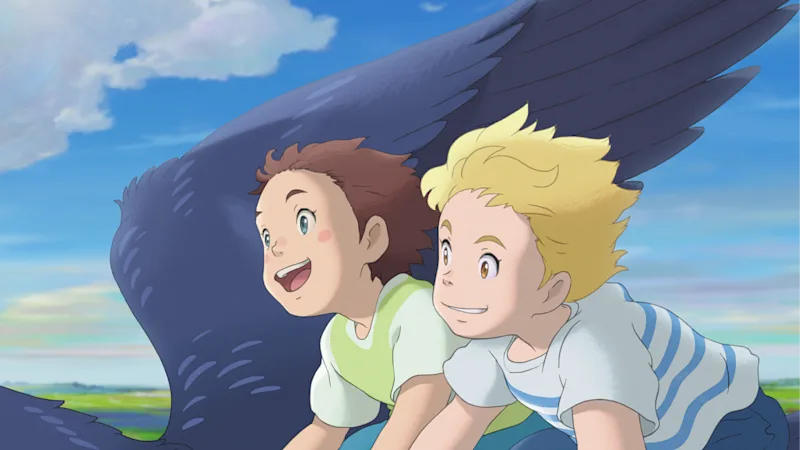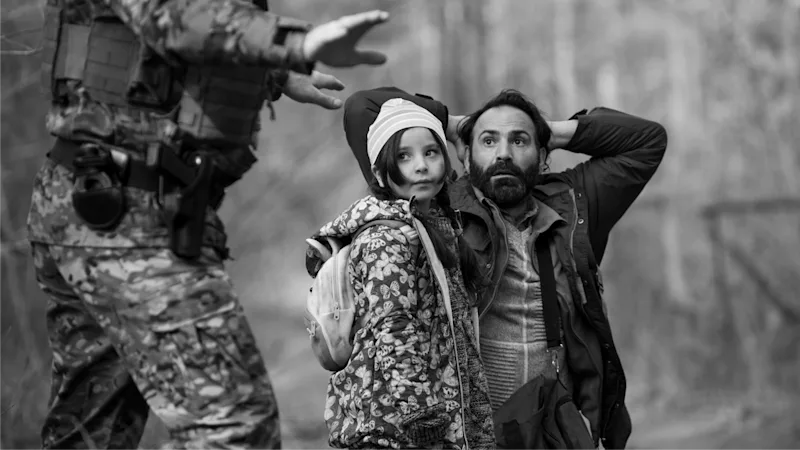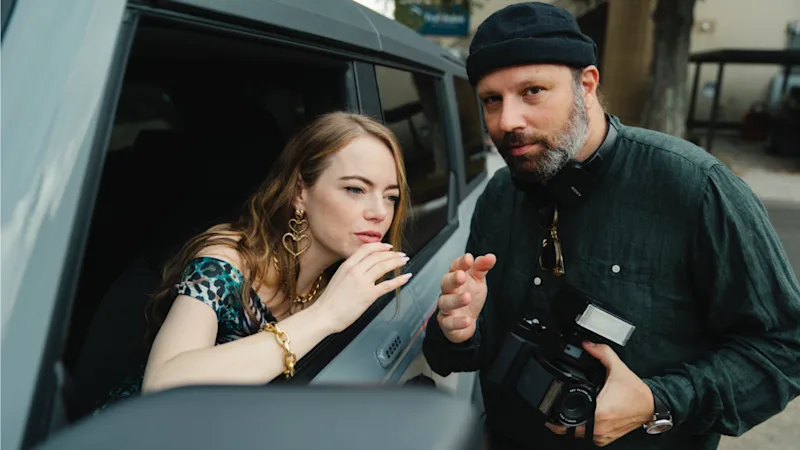Arriving in the wake of Christopher Nolan's Oppenheimer, director Steve James' documentary A Compassionate Spy serves as a companion piece of sorts, looking at the life and lies of Ted Hall. The youngest physicist on the Manhattan Project, Hall passed nuclear secrets — including key information about the creation of the atomic bomb — to the Soviet Union.
"I'd like to joke that Christopher Nolan heard I was doing this and decided he wanted to do his film, but I don't think that was the case," James, a two-time Oscar nominee for Hoop Dreams (1994) and Abacus: Small Enough to Jail (2016), says. "We were deep into our film by the time we heard what he was up to, so I think it was just a confluence there."
Oppenheimer does explore Robert Oppenheimer's concern over a spy at Los Alamos, but Nolan's film reveals that spy to be German theoretical physicist Klaus Fuchs. A Compassionate Spy tells the story of a more unexpected atomic spy: A wunderkind 18-year-old scientist recruited as a Harvard undergraduate. As well as looking at his life and work, the documentary examines the aftermath of Hall's espionage.
"One of the things the film goes to great lengths to show is that his fears about what could have happened in the post-World War II era with the United States were grounded in real, genuine concerns," explains James. It was not, he adds, "not some kind of crazy, naive teenage fantasy."
After the war, Hall met and fell in love with a woman named Joan, who would protect his secret over the course of their 50-year marriage. As such, James' film goes beyond the tale of espionage he was expecting to tell. In addition to archive footage and interviews Hall filmed before his death, the filmmaker spent considerable time talking to Joan. Telling the story from her perspective and that of family and close friends gave James a unique take on the highly controversial historical moment.
"She was such a brilliant person in her own right," he says. "I was as taken with the idea of telling Joan's story as I was Ted's."
A.frame: Ted's version of events is well documented. How much did the testimony of his wife and widow, Joan, shape and influence the documentary's narrative?
I've learned over the years that it's good to have a plan but not be married to it. In this case, Joan was a big part of why I wanted to tell the story. There was something about that marriage and her impact on Ted — even though she didn't know Ted when he committed the espionage. She was such a vital part of his life, protecting him and her family and helping him through that. The two of them together gave me a chance to tell a story set in this world of espionage at a significant historical time, but it is this very personal story of these individuals who acted at such a young age to do what they did.
Despite his age, Ted's bigger-picture view on the world was very mature. Did that surprise you?
It was amazing. There's a moment early in the film where Joan and her daughters are sitting around the kitchen table. They're reading letters that Ted wrote to his older brother, Ed, from Harvard. These letters were written when Ted was 16 and 17 — because he went to Harvard at 15 — and he's delivering this incredibly trenchant analysis of everything wrong with Harvard as an educational institution. And he was absolutely right! That gives you an idea of just how precociously smart this guy was. He got out to Los Alamos at the age of 18, and then by the time he turned 19, he had decided he would give secrets to the Soviets. His reasoning was not without merit. One of the things the film goes to great lengths to show is that his fears about what could possibly have happened in the post-World War II era with the United States were grounded in real, genuine concerns — not some kind of crazy, naive teenage fantasy.
You use dramatizations to reconstruct part of Ted's story. Was that always the plan, or was that something that came out of the creative process for you? Executed that type of recreation in a documentary can be a fragile balance.
It's the first time I've done it in a documentary. All the previous films I've done have never had any recreations or reconstructions or dramatizations — whatever the word is that you want to use. Fairly early in the process, especially after the first major interview with Joan, it dawned on me that we may want to do that. These stories that she was telling, and then when I was able to see Ted's version of the stories through archival interviews, are so particular and personal that there would be no way to bring them to life beyond a talking head interview. There were no photographs or documentation.
You look at Joan, who was 91 years old when we first interviewed her in the film, and it's hard to imagine what she and Ted were like when they were literally in their early 20s, meeting for the first time and Ted had done all these things as a teenager. I thought it would be important for the audience to grasp this relationship, who these young people were, and their passion. We're living in a time right now where young people are looking around at the world we're living in and the precipice we find ourselves on in various ways, and just trying to decide what they need to do about it. These were two young people that acted.
When it came to the archive footage, how much was available? And how easy was it to get hold of?
We had an incredible archival producer who is a filmmaker in her own right called Sierra Pettengill, and she turned up all kinds of amazing footage. I was the editor of the film as well, so during that process, I started to search the internet depending on what section of the film I was working on. When I got to the Hiroshima section, I found some of the most extraordinary stuff, and Sierra found even more once we turned her loose on it. It's amazing how much is out there if you have the patience to search for it.
One of the things I found, which I love in the film, was the film Mission to Moscow. It was made during the war and was the story of how Roosevelt sent his ambassador to the Soviet Union to write a book about them, and then they came back and made a full-on Hollywood movie about it. It's a remarkable thing. I discovered all kinds of amazing things like that. Frank Capra made two films that talked about the beauty of the Soviet people and how brave and wonderful they were. It was all part of an orchestrated campaign by the U.S. government to make the American people feel good about the Soviets as our allies. It's also really interesting in a historical sense, because while they were doing all of that, they were also very fearful of anyone who had been in the Communist Party and might in any way share anything with the Soviets.

Another key part of telling Ted's story was Ted's children and the children of his best friend, Saville "Savy" Sax. Was it hard to get them to talk so openly?
With Savy's kids, I had to talk them through what I was doing, and it took a little bit of convincing to get them to go along with this. Part of it was because it was a tremendously tumultuous time, particularly in that family. Ted, after the spying and after World War II, went on to be an amazingly successful scientist in biochemistry. Savy struggled mightily to look after his family and to be a provider with what he had done. His family bore the brunt of that, so it took some convincing. On Ted's side, his daughter Ruth was keen to be a part of it, but it was tougher for another of his daughters, Sara, because she was a very private person. She's the one in the film who, when she discovered and started to piece together what her father had done, it completely rocked her world. There was a process of winning their trust and getting them to be willing to open up. I'm so thankful for it because, to me, this was such a personal story. It's a story of espionage, but it's very much a family story and a story of this couple, Ted and Joan.
With any documentary, there are often hard or uncomfortable questions that have to be asked of the people who are in front of you. What were those here?
Let's be clear: Ted Hall did not give the bomb to the Soviets. The Soviet Union was going to get the bomb whether Ted or any other spy did anything. They were researching it, and they had brilliant scientists. They were well behind us, but it was going to happen. What Ted's actions did was help them get it sooner. Given the reality of what Ted did, he did contribute in some ways, without question, to the impending arms race and to the mutually assured destruction that is the world we live in and have lived in for 70 or 80 years. Asking Joan to what degree Ted might've felt some responsibility for that, because clearly Ted was very unhappy with the massive arms race that came out of the end of World War II, was a hard question to ask her. True to her convictions, Joan acknowledged that it was tough, but she also said that all of that was completely out of everyone's control. The arms race was something governments wanted, capitalism wanted, and business wanted, and you can't hold people like Ted responsible for what happened.
You include Ted's message to the youth of tomorrow at the end of the documentary. It's heartbreaking and terrifying but beautiful, and almost like a cry for help. What did you feel when you saw that footage for the first time?
When I saw that, I think I said, 'There's the end of our film.' Because not only was Ted speaking about this profound experience he had had, about what the world had gone through around World War II and the bomb, [but] he was saying that you can't let politicians and leaders dictate where our lives go and where history goes. When I saw that, I immediately thought of climate change, but now when I see it, I think of both climate change and AI. Here is this technology that has the ability to profoundly shape the world we live in for good and very much for not so good. Most of us feel powerless to have anything to do with what happens, so Ted's message really resonates with me today in so many ways.
RELATED CONTENT:
Steve James: 5 Films That Had a Major Impact on Me
Everything to Know About Christopher Nolan's 'Oppenheimer'
Why Judy Blume Agreed to Star in a Documentary About Her Life







